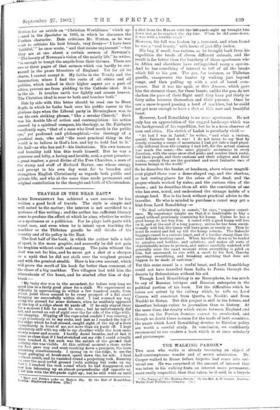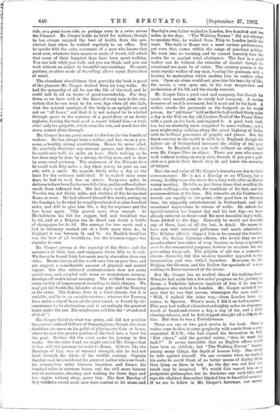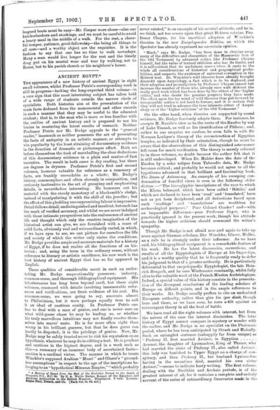THE WALKING PARSON.* Tau man who walks is already becoming
an object of half-contemptuous wonder and of secret admiration. Mr. Cooper walked to Rome before bicycles had come into uni- versal use. He was surprised at the amount of interest that was taken in his walking feats, an interest more permanent, more really respectful, than that taken, be it said, in a bicycle
• The Tramps of "The Wallang Parson." By the Bev. A. N. Cooper. London : Walter Scott Publiahing Company. [Gs. I
ride, or a great horse ride, or perhaps even in a swim across the Channel. Mr. Cooper holds no brief for walkers, though he has always enjoyed the best of health from the pre- clerical days when he walked regularly to an office. But be speaks with the calm assurance of a man who knows that most men, whatever their means or mode of travel, will admit that some of their happiest days have been spent walking. You can talk while you walk and you can think, and you can walk without an object in beautiful surroundings. No sport, pastime, or other mode of travelling allows equal distraction of mind.
The abundant cheerfulness that pervades the book is proof of the pleasure Mr. Cooper derived from his long walks. He had the sympathy of all, he saw the life of the road, and he could talk to all on terms of good-comradeship. For deep down, as we have said, in the heart of every man is the con- viction that he can trust to his own legs when all else fails, that the natural carriage of the body is an upright one and not on " all fours," and that it is not natural to be whirled through space in the costume of a pearl-diver or an Arctic explorer, leaving the trail as of a comet behind him,—a trail, alas ! only too palpable, which even the sun, and much less the stars, cannot shine through.
Mr. Cooper has no great secret to disclose for the benefit of walkers. He has always been a walker, and has, we may pre- sume, a healthy, strong constitution. Hence he never ailed. He carefully disclaims any unusual powers, and denies that he could ever walk six miles an hour. Such walking as he has done may be done by a strong, healthy man, and is done by some rural postmen. The statement of the Primate that he could walk fifty miles a day when young he puts on one side with a smile. He regards thirty miles a day as the limit for the ordinary individual. If he walked more some days, he had to walk less on others. Forty-two miles he declares to have been far too much for him, and be suffered after- wards from inflamed feet. His last day's walk from Civita Vecchia was not thirty miles, and starting at five he reached Rome at noon. He had allowed himself five weeks, resting on the Sundays, to do what he roughly estimated at nine hundred miles, and £30 to give him 10s. a day for expenses and the fare home again. This proved more than enough. At Markolsheim his bill for supper, bed, and breakfast was ls. (3d., and at a Belgian inn he dined and drank a bottle of champagne for 4s. 8d. His average for two meals and a bed in Germany worked out at a little more than 4s., in England it was between 7s. and 8s. An English breakfast was the best of all breakfasts, but the German supper was superior to oars.
Mr. Cooper groans at the rapacity of the Swiss and the meanness of their fare, and compares Swiss bills to Scotch. We fancy he found Irish fare more nearly starvation than any other. Mountaineers all the world over live on poor fare, and yet support a considerable amount of physical and mental vigour. But this enforced abstemiousness does not make genial men, and, coupled with stern or monotonous scenery, develops all man's latent savagery. The civilised races show every variety of temperament according to their climate. We may put the South Sea Islander at one pole and the Touareg at the other. The Eskimo lives in a bard climate, but it is variable, and he is an amiable creature ; whereas the Touareg lives under a sky of brass all the year round, is forced by cir- cumstances to be abstemious, and is accordingly the greatest brute under the sun. His neighbours call him the "abandoned of God" !
Mr. Cooper fared on what was going, and did not practice the austere rules of Gilbert of Sempringhani, though the saint doubtless ate more on his political pilgrimages than at home, where he cast the greater portion of his food into a bowl for the poor. Neither did the saint make his journey in five weeks. On the other hand, we might remind Mr. Cooper that he has still two journeys to make to Rome. Gilbert, like the Barclays of Ury, was of unusual strength, else he had not lived through the whole of the twelfth century. Captain Barclay may be considered the greatest walker who ever lived; his seventy-two miles between breakfast and dinner, his hundred miles in nineteen hours, and the still more famous feat of endurance, shooting and walking for three days and two nights without sleep, prove this. The first Barclay of Ury wielded a sword most men were content to let alone, and • Barclay's own father walked to London, five hundred and tea miles, in ten days. " The Walking Parson" did not attempt to emulate this ; he walked from Filey to London inside the week. The walk to Rome was a more serious performance, yet even that comes within the range of practical politics. He went into no training, and he cannot honestly turn the scales for or against total abstinence. The fact is, a good walker can do without the stimulus of alcohol, though its occasional use must be of value. The country parson is the most regular walker of any man, barring the postman, with a leaning to moderation which enables him to outlive other men. Open air alone would not give him his tenacity of life; the secret, a very open one, is the true temperance and moderation of his life and the steady exercise.
Mr. Cooper likes a good road and company, but though his
roads were mostly good, he rarely had company. A. certain firmness of road is necessary, but it must not be too hard. A walker avoids the pavement or the footpath as he would poison. An " old timer" told us that he had walked thirty miles a day in the Fall on the old Cariboo Trail of the Frazer River with a pack on his back, and enjoyed it. A good bush trail, too, has an elasticity most congenial to some walkers ; and a man might enjoy walking along the great highway of India, with its brilliant panorama of peoples and places. But the finest country in the world to walk in is England, though the lighter air of Switzerland increases the ability of the poor walker. In England you can walk without an object, and even Mr. Cooper likes an object. There are men who cannot walk without resting on every stile, though if you put a golf- club or a gun in their hands they do not know the meaning of fatigue.
Now the real value of Mr. Cooper's remarks are due to their common-sense. He is not a Barclay or an O'Leary, but a strong, healthy man who starts for a long walk after an Easter vestry meeting. He tells us just those items that would strike a man walking,—the roads, the condition of his feet, and the accommodation at the inns. His remarks on his Continental travels are equally to the point,—the good fare at German inns, the niggardly entertainment in Switzerland, and the occasional impressions he retains of walks. He selects for special mention his longest day and his last day—we have already referred to these—and his most beautiful day's walk, from Altdorf to the Alps. Naturally he would not describe any of these, least of all the last, in detail. He seems to have met with universal politeness and much admiration. The Belgian officials clapped him as he crossed the frontier. Even the Italian Customs officers, who levied duty on our grandmothers' two cakes of soap because so large a quantity meet be for commercial purposes, forbore to examine his un- pretending knapsack. The pilgrim of old was a somewhat riotous character, but this modern traveller appealed to the imagination, and was, withal, harmless. Moreover, to the Belgian, the German, and the Italian the spectacle of a mall walking to Rome savoured of the heroic.
But Mr. Cooper has no exalted idea of his walking feats. When he had made but a few miles' progress on his journey to Rome, a Yorkshire labourer inquired of him if he was the gentleman who walked to London. Mr. Cooper satisfied the man that he was that person, whereupon the man said :— " Well, I walked the other way,—from London here, or rather, to Speeton. What's more, I did it on half-a-crown. This man had walked a hundred and eighty miles on sixpenny- worth of bread-and-cheese a day, a cup of tea, and a little chewing tobacco, and he had stepped straight off a ship to do this. But then he was a Yorkshireman.
There are one or two good stories in the book. Once a
waiter came to him in some perplexity with a note from a con- sequential K.C.B., who had signed his decoration in full- "Butwhere," said the puzzled waiter, "does he want his bath ?" It seems incredible that an English officer could have been so childish ; but "The Walking Parson" learnt, among many things, the depth of human folly. One story he tells against himself. On one occasion when he washed them than lying on them in bed. As the dye was not fast the his socks he could think of no better means of result may be imagined. We would fain regard him as a peripatetic philosopher, but he disclaims any such title, and says the slightest discomfort blinded him to beautiful scenery. If we are to follow in Mr. Cooper's footsteps, our sever,- leagued boots must be easy—Mr. Cooper wore shoes—also our knickerbockers and stockings, and we must be careful to avoid a heavy meal in the middle of a walk. For the rest, a cheer- ful temper, patience, good-fellowship--the being all things to all men—and a worthy object are the requisites. It is the fashion to say that one has no time to walk nowadays. Many a man would live longer for the rest and the timely drag put on his mental wear and tear by walking, not to Rome, but to his parish church or his neighbour's house.












































 Previous page
Previous page